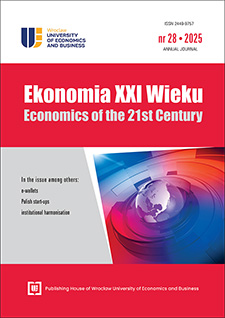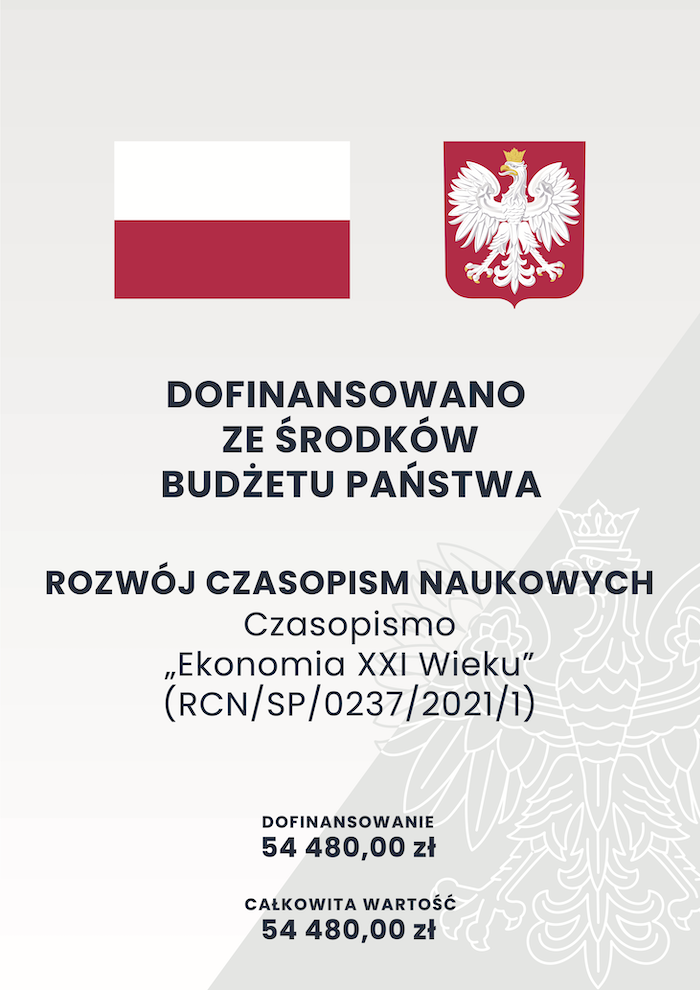Rola Trybunału Konstytucyjnego w harmonizacji systemu instytucjonalnego w Polsce
DOI:
https://doi.org/10.15611/e21.2025.03Słowa kluczowe:
nowa ekonomia instytucjonalna, zmiana instytucjonalna, system instytucjonalny, harmonizacja systemu instytucjonalnegoAbstrakt
Cel: Artykuł koncentruje się na zagadnieniu wpływu instytucji formalnych na efektywność procesów gospodarczych. Przedstawiono tu mechanizmy zabezpieczające przed jego destabilizacją. W końcowej empirycznej części artykułu podjęto próbę pokazania, w jaki sposób Trybunał Konstytucyjny może wpływać na harmonizację instytucji, a tym samym na jakość procesów gospodarczych.
Metodyka: W artykule zastosowano podejście hipotetyczno-dedukcyjne oparte na ogólnych stwierdzeniach dotyczących koncepcji instytucji. Część empiryczna została sformułowana w oparciu o studia przypadków i deontyczną analizę charakteru modalnego.
Wyniki: We wnioskach stwierdzono, że pomimo faktu, że wpływ Trybunału Konstytucyjnego na harmonizację systemu instytucjonalnego jest zjawiskiem realnym, Trybunał Konstytucyjny ma jedynie marginalną zdolność do ochrony systemu instytucjonalnego.
Implikacje i rekomendacje: Artykuł wskazuje na potrzebę wzmocnienia mechanizmów ochrony instytucjonalnej wykraczających poza orzecznictwo konstytucyjne. Zwiększenie niezależności Trybunału oraz rozwój jego instrumentarium proceduralnego mogłyby podnieść jego skuteczność jako strażnika stabilności instytucjonalnej.
Oryginalność/wartość: Opracowanie wnosi interdyscyplinarne spojrzenie na przecięciu prawa konstytucyjnego i ekonomii instytucjonalnej. Stanowi wkład do literatury, ukazując systemowe konsekwencje orzecznictwa konstytucyjnego dla ładu gospodarczego oraz zależności ścieżkowej.
Pobrania
Bibliografia
Bunge, M. (1996). Finding Philosophy in Social Science. Yale University Press.
Ciżyńska, A., Karakulski, J., Kos, K., & Pyłko, J. (Eds.). (2017). Prawo konstytucyjne wraz z orzecznictwem Trybunału Konstytucyjnego. Wydawnictwo C. H. Beck.
Coase, R. R. (1998). The New Institutional Economics. The American Economic Review, 88(2), 72-74.
Constitutional Tribunal. (2007, October 24). The Judgment of the Constitutional Tribunal Dated October 24, 2007.
Constitutional Tribunal. (2014, September 18). The Judgment of the Constitutional Tribunal Dated September 18, 2014.
Constitutional Tribunal. (2016, December 19). The Act of 30 November 2016 on the Status of the Judges of the Constitutional Tribunal. Journal of Laws of the Republic of Poland. https://trybunal.gov.pl/fileadmin/content/dokumenty/Akty_normatywne/The_Act_on_the_Status_of_the_Judges_of_ the_Constitutional_Tribunal__as_amended_in_2017__en.pdf
Czetwertyński, S. (2023). Człowiek gospodarujący − Niebezpieczna idea. Wydawnictwo Uniwersytetu Ekonomicznego we Wrocławiu. https://doi.org/10.15611/2023.40.4
Czetwertyński, S., & Sukiennik, J. (2023). Skuteczność formalnych mechanizmów ochrony systemu instytucjonalnego w Polsce. The Scientific Journal of the Polish Economic Society, 10(18), 70-85. https://doi.org/10.26366/PTE.ZG.2023.237
Durkheim, É. (2012). Zasady metody socjologicznej (2nd edition). Wydawnictwo Naukowe PWN.
Fiedor, B. (2015). Instytucje formalne i nieformalne w kształtowaniu trwałego rozwoju. Studia i Prace WNEiZ, 2, 83-108. https://doi.org/10.18276/sip.2015.40/2-07
Internetowy Portal Orzeczeń Trybunału Konstytucyjnego. (2024). Rozpoznanie właściwe [Dataset]. https://ipo.trybunal.gov.pl/ipo/Szukaj?cid=4
Kochanowski, J. (2008). O naprawie procesu stanowienia prawa. Ruch prawniczy, ekonomiczny i socjologiczny, LXX(2), 5-8.
Konstytucja Rzeczypospolitej Polskiej. (1997).
North, D. C. (1990). Institutions, Institutional Change, and Economic Performance. Cambridge University Press.
Obwieszczenie Marszałka Sejmu Rzeczypospolitej Polskiej z dnia 20 lutego 2013 r. w sprawie ogłoszenia jednolitego tekstu ustawy − Prawo o zgromadzeniach (2013). Dz.U. 2013 poz. 397.
Ratajczak, M. (1994). Nurt instytucjonalny we współczesnej myśli ekonomicznej. Ruch Prawniczy, Ekonomiczny i Socjologiczny, LVI(1), 27-39.
Sejm Rzeczpospolitej Polskiej. (2015a). Podstawowe dane statystyczne dotyczące prac Sejmu VII kadencji (8 listopada 2011 r. − 11 listopada 2015 r.). https://www.sejm.gov.pl/sejm7.nsf/page.xsp/prace_sejmu
Sejm Rzeczpospolitej Polskiej. (2015b). VII kadencja Sejmu – podsumowanie w liczbach. https://www.sejm.gov.pl/sejm7.nsf/page.xsp/prace_sejmu
Sejm Rzeczpospolitej Polskiej. (2019). Podsumowanie VIII kadencji Sejmu. Prace Izby w latach 2015−2019. https://www.sejm.gov.pl/sejm8.nsf/home.xsp
Sejm Rzeczpospolitej Polskiej. (2024). Uchwalone ustawy. IX kadencja. https://www.sejm.gov.pl/sejm9.nsf/agent.xsp?symbol=USTAWYALL&NrKadencji=9&NrPosiedzenia=60
Spencer, H. (1987). The Principles of Sociology. D. Appleton and Company.
Sukiennik, J. (2023). Mechanisms of protecting the institutional system in Poland. Ekonomia i Prawo, 22(2), 327-344. https://doi.org/10.12775/EiP.2023.019
Sukiennik, J., Dokurno, Z., & Fiedor, B. (2017). System instytucjonalnej równowagi a proces zmian instytucjonalnych z perspektywy zrównoważonego rozwoju. Ekonomista, 2, 121-143.
Ustawa z dnia 24 lipca 2015 r. − Prawo o zgromadzeniach (2015). Dz.U. 2015 poz. 1485.
Veblen, T. (2007). The Theory of the Leisure Class. Oxford University Press.
Williamson, O. E. (2000). The New Institutional Economics: Taking Stock, Looking Ahead. Journal of Economic Literature, 38(3), 595-613. https://doi.org/10.1257/jel.38.3.595








